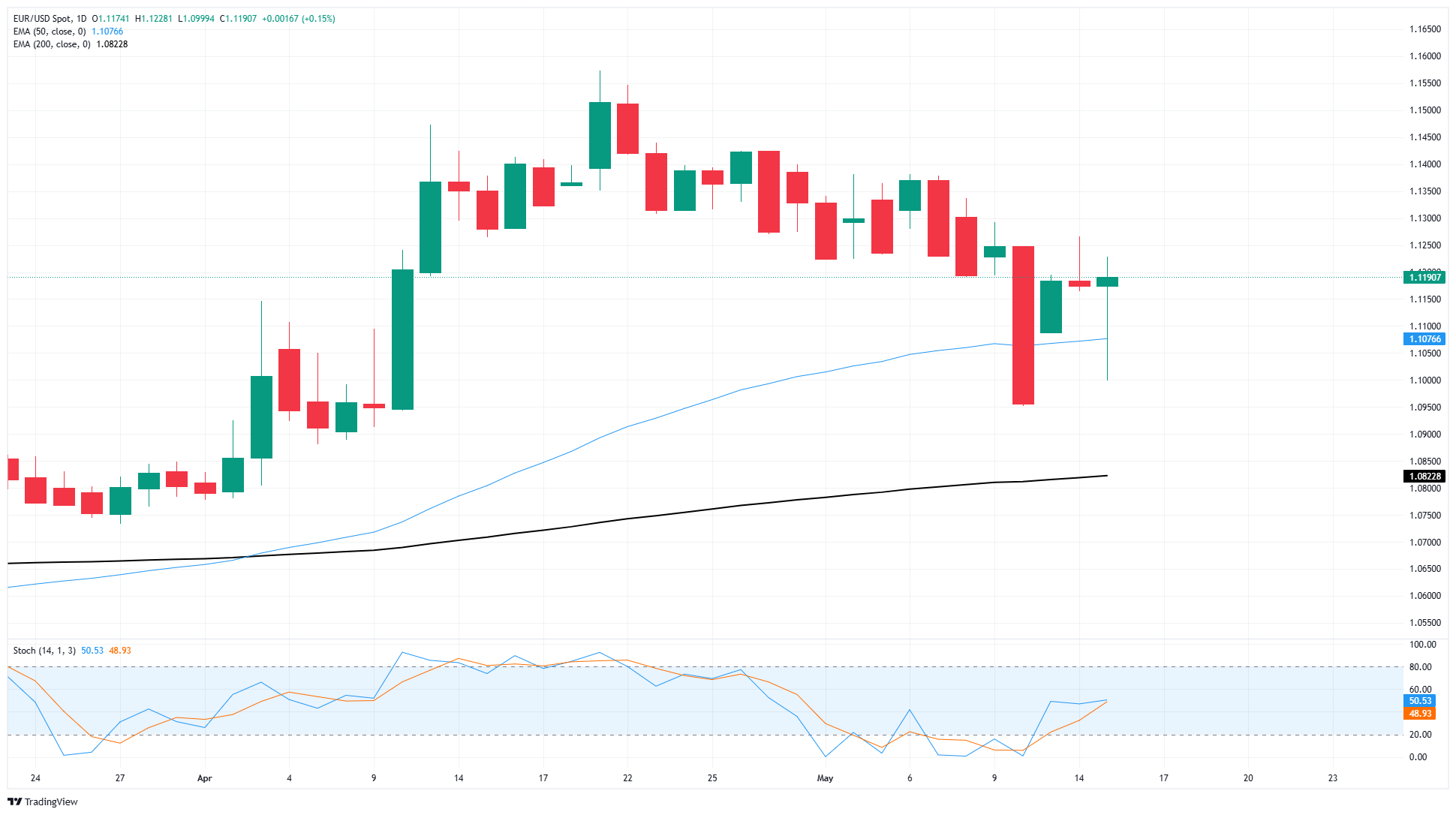EUR/USD whipsaws on Thursday to end right where it started
- EUR/USD fell early on Thursday, before a firm recovery back into the day’s opening bids.
- US PPI inflation eased faster than expected, alleviating tariff fallout fears for the time being.
- The UoM’s latest consumer sentiment survey results will drop on Friday.
EUR/USD whipsawed on Thursday, briefly dipping back below the 50-day Exponential Moving Average (EMA) and tapping the 1.1000 level for the second time in a week. A late recovery pushed Fiber bids back to where they started the trading day, near the 1.1200 handle.
Pan-European Gross Domestic Product (GDP) figures for the first quarter ticked slightly lower on the near end of the curve, dipping to 0.3% QoQ. Annualized GDP still held steady at 1.2% YoY, but a soft patch in the Q1 data is still giving Fiber traders a reason to pause. In the US, the Producer Price Index (PPI) inflation decreased to only 0.1% month-over-month in April, allowing investors to momentarily relax, sensing that tariff effects haven’t yet influenced key economic data.
The latest Consumer Sentiment Index from the University of Michigan (UoM) is set to be released on Friday. Market forecasts anticipate a rise in consumer survey results, which have dropped for four straight months, reaching a two-year low of 52.2. Investors are hopeful that consumer sentiment will show some recovery, potentially boosting the index back to 53.4.
EUR/USD price forecast
Thursday’s back-and-forth chart action leaves the Fiber on pace to continue its steady downside drift; bullish momentum is still keeping EUR/USD bolstered above key technicals for the time being. However, the pair’s slow and steady grind lower from late April’s peak just shy of the 1.1600 handle remains difficult to ignore.
EUR/USD daily chart

Euro FAQs
The Euro is the currency for the 19 European Union countries that belong to the Eurozone. It is the second most heavily traded currency in the world behind the US Dollar. In 2022, it accounted for 31% of all foreign exchange transactions, with an average daily turnover of over $2.2 trillion a day. EUR/USD is the most heavily traded currency pair in the world, accounting for an estimated 30% off all transactions, followed by EUR/JPY (4%), EUR/GBP (3%) and EUR/AUD (2%).
The European Central Bank (ECB) in Frankfurt, Germany, is the reserve bank for the Eurozone. The ECB sets interest rates and manages monetary policy. The ECB’s primary mandate is to maintain price stability, which means either controlling inflation or stimulating growth. Its primary tool is the raising or lowering of interest rates. Relatively high interest rates – or the expectation of higher rates – will usually benefit the Euro and vice versa. The ECB Governing Council makes monetary policy decisions at meetings held eight times a year. Decisions are made by heads of the Eurozone national banks and six permanent members, including the President of the ECB, Christine Lagarde.
Eurozone inflation data, measured by the Harmonized Index of Consumer Prices (HICP), is an important econometric for the Euro. If inflation rises more than expected, especially if above the ECB’s 2% target, it obliges the ECB to raise interest rates to bring it back under control. Relatively high interest rates compared to its counterparts will usually benefit the Euro, as it makes the region more attractive as a place for global investors to park their money.
Data releases gauge the health of the economy and can impact on the Euro. Indicators such as GDP, Manufacturing and Services PMIs, employment, and consumer sentiment surveys can all influence the direction of the single currency. A strong economy is good for the Euro. Not only does it attract more foreign investment but it may encourage the ECB to put up interest rates, which will directly strengthen the Euro. Otherwise, if economic data is weak, the Euro is likely to fall. Economic data for the four largest economies in the euro area (Germany, France, Italy and Spain) are especially significant, as they account for 75% of the Eurozone’s economy.
Another significant data release for the Euro is the Trade Balance. This indicator measures the difference between what a country earns from its exports and what it spends on imports over a given period. If a country produces highly sought after exports then its currency will gain in value purely from the extra demand created from foreign buyers seeking to purchase these goods. Therefore, a positive net Trade Balance strengthens a currency and vice versa for a negative balance.


